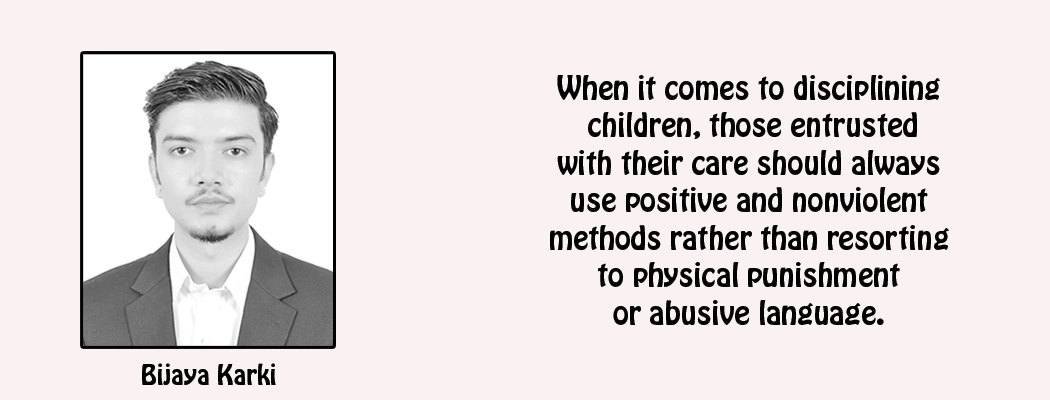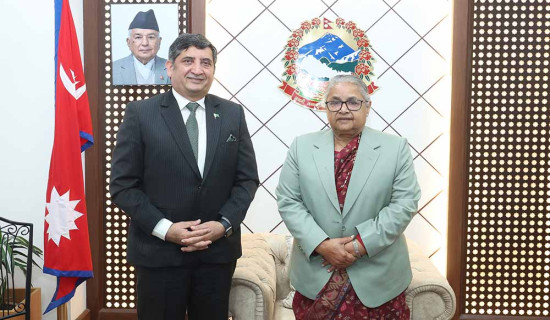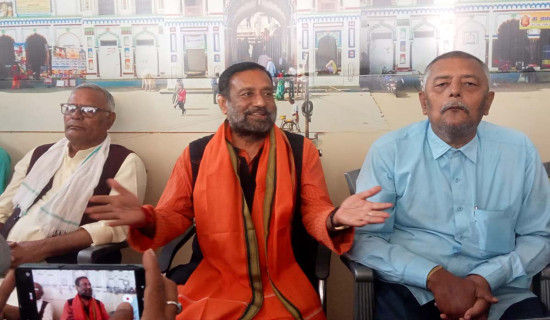- Saturday, 28 February 2026
End Corporal Punishment In Schools
Nepal is the first country in South Asia and the 54th in the world to entirely prohibit corporal punishment of children. However, children being brutally beaten up in schools by teachers and school personnel, makes headlines occasionally. Many such cases have resulted in the death of the victims. Corporal punishment in school is defined as the intentional use of physical force, by teachers or school personnel towards children, to cause physical pain or discomfort of any sort, in response to misbehaviour, disobedience, or offensive acts by children. For example, pressing a pencil between two fingers, forcing one to maintain uncomfortable and painful positions, pulling the ears or the hair from the temples, hitting or spanking with bare hands or with an object, etc.
Compensation
Every day, students are subjected to various forms of corporal punishment in schools, despite corporal punishment of children being illegal. The practice persists in the country because students don’t know about their rights, and their parents are also unaware of the law. Article 39 of the Constitution of Nepal, 2015 that deals with “Rights of Child” states that children shouldn’t be subjected to physical, mental, or any form of torture in home, school, or other places and, any violation shall be punishable by law, and the victim is entitled to obtain compensation from the offender. Today, anyone who uses corporal punishment to discipline children can be prosecuted. However, instead of taking administrative and legal actions against the offender, generally, schools mediate cases of corporal punishment by conducting a closed-door meeting between the concerned parents and the offender.
The practice of “closed-door mediation” is concerning because when the offender is not held legally responsible and condemned. Such offenders may continue to repeat it in the future, too, and more children will suffer at their hands. On September 18, 2018, Nepal enacted “The Act Relating to Children.” Section 2(j) of the Act defines a child as, “a person who has not completed the age of 18 years.” As per section 66(2)(d) of the Act, “Any person is deemed to have committed violence against the child if the person inflicts physical or mental punishment or behaves in an undignified way whether at home, school, or any other place.”
In case of an offence, Section 72(3)(a) of the Act has provisioned a fine of up to Rs. 50,000 and imprisonment for up to one year. Furthermore, Section 67 states that, if an offence against a child is committed by a person working in any public or private organisation, then such a person will get dismissed as per the law, and depending on the severity of the crime, such a person will be ineligible for a maximum of 10 years to be involved in the future in any activity that involves direct contact with the child or to be appointed, nominated, or elected to such a private institution or organisation.
At one time, schools could expel children for displaying misconduct or issue transfer certificates at their discretion. Today, in the context of a child acquiring basic education (i.e., from grade 1 to 8), schools cannot even expel or give transfer certificates at their will on ground of misconduct or disobedience. According to Section 10 of the Act Relating to Compulsory and Free Education 2018, a child receiving basic education cannot be expelled for engaging in undisciplined behaviour. The Act mandates that schools must offer such a child access to counselling services and implement psychosocial counselling in collaboration with the guardians. Also, Section 32 of the same act states that, if a child who hasn't finished the basic level of education is wrongfully expelled from the school, the child's guardian can file a petition at the judicial committee of the relevant local level within 15 days.
Psychological effects
Studies have shown that corporal punishment leads to counter-productive results such as learning difficulties, behavioural problems, depression, low self-esteem, and low confidence, among others, long-term psychological effects. An expert on the effects of corporal punishment, Elizabeth Gershoff, says, "Hitting children does not teach them right from wrong, and physical punishment might lead to mental health problems in children by increasing their stress levels." This is why corporal punishment, no matter how mild, should not be tolerated in schools or any other setting. Aside from the pain and injuries that often come from corporal punishment, it has also been proven to have detrimental effects on students' mental health, well-being, and academic performance. This is why we should pay meticulous attention and take appropriate actions when children come home hurt or complain about their teachers.
When it comes to disciplining children, those entrusted with their care should always use positive and nonviolent methods rather than resorting to physical punishment or abusive language. For example, instead of shaming children when they do wrong, we can praise them whenever they do right. Instead of using children as examples of wrongdoing, we may teach them by not only doing it ourselves but also by showing them how it's done. Similarly, there are a plethora of methods to discipline children. Every child deserves to be treated with love, kindness, and compassion. Children’s rights to dignity and physical integrity must be unconditionally respected. We have both legal and moral obligations towards children because they are the future, and how we treat them today has the potential to shape the world of tomorrow.
(Karki is a B.A.LL.B Graduate, Kathmandu School of Law.)









-original-thumb.jpg)






